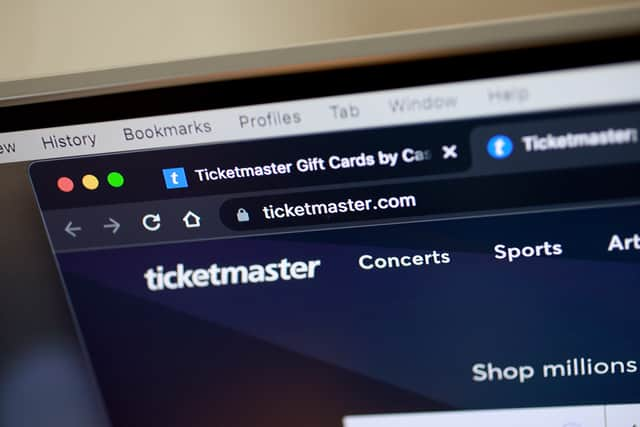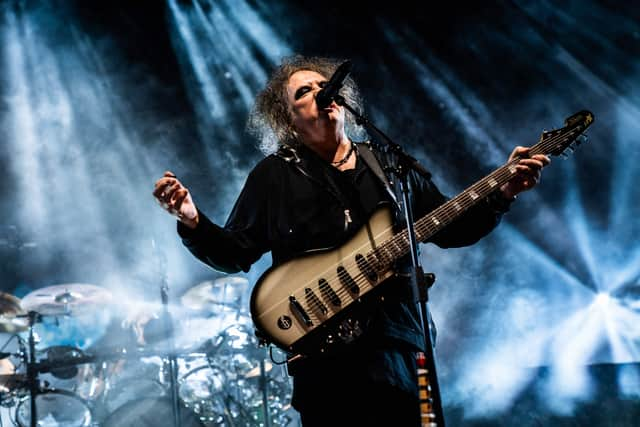Live Nation CEO addresses The Cure Ticketmaster price row: ‘You don’t have to underprice yourself’
and live on Freeview channel 276
Live Nation’s CEO Michael Rapino has weighed in on the recent controversy surrounding Ticketmaster and The Cure’s upcoming American tour, NME reports. After fans reported massive hidden fees when buying tickets for the tour, the band’s singer Robert Smith called out Ticketmaster, calling their scheme “a bit of a scam”.
Taking a stab at the vendor over a fee collected on their “Verified Fan” tickets for The Cure’s US tour, the Boys Don’t Cry singer called on the company to keep prices down. Having pledged to keep ticket prices low to make them more affordable for fans, Smith took to Twitter, saying: “I am as sickened as you all are by today’s Ticketmaster ‘fees’ debacle. To be very clear: the artist has no way to limit them.”
Advertisement
Hide AdAdvertisement
Hide AdIn one case, Ticketmaster’s ‘hidden fees’ saw the price of two $20 seats increase to $75 just before checkout - an increase of $15 that is not shown on the original ticket price. The company has such control over the ticket and entertainment industry that there is often little musicians can do, as the vendor has a near monopoly on concert and event tickets.
While the Just Like Heaven singer managed to convince the ticket giant to issue small reimbursements for fans who bought the verified tickets, Smith turned to Ticketmaster looking for an explanation for why the tickets, promised to sell at face value, came with additional charges.
Now, Rapino has addressed the row. Speaking on The Bob Lefsetz Podcast, he said: We were proud of Ticketmaster’s side. We did a ton of work with Robert, making sure [tickets] were non-transferable, that it would be a face value [ticket] exchange and verified, doing all we could to put all the roadblocks to deliver his ticket prices to the fans.
Mr Rapino continued: “There was a screenshot of a venue, which wasn’t even a Live Nation venue… that showed a ticket service fee of $20 on $20. It doesn’t matter whether justifying the service fee is a good idea or not, we have an industry where we have to build some credibility back.
Advertisement
Hide AdAdvertisement
Hide Ad“I couldn’t defend in any version that we were going to add a $20 service fee to a $20 ticket. We made a decision that we would spend some money, give back the $10, and get it to a reasonable place for those fans.”
On the podcast, he also confirmed that Live Nation, who is the parent company of Ticketmaster, absorbed the cost of the reimbursement, saying it “was a fast decision”, and that they “thought it was worth the million dollars or so to send the right message”.


When asked if it was reasonable to see The Cure for $20, he said no, claiming that fans would be willing to pay high ticket costs for “special moments in their life”, adding: “I think the pricing of concerts in general – there’s this fine line between, yes, we want it accessible, and it’s a fine art and there’s a price to it.
“It’s a magic moment, maybe twice a year – way cheaper than Disneyland, or the Super Bowl, or the NFL or the NBA playoffs, or an expensive night out. So it’s really cheap overall.
Advertisement
Hide AdAdvertisement
Hide Ad“This is a great, great product that people will buy, as they’re gonna buy the Gucci bag. They’re gonna buy moments in life where they will step up, and spoil themselves – the big screen TV and or whatever it may be.”


“This is a business where we can charge a bit more. I’m not saying excessively, but it’s a great two-hour performance of a lifetime that happens once every three, four years in that market. You don’t have to underprice yourself — low to middle income [people] will make their way to that arena for that special night.”
He also said that the company doesn’t set prices themselves, but that the cost of tickets are up to the artist, which contradicts Robert Smith’s previous claims that artists have virtually no control over ticket prices. Rapino also said that about 20 percent of service fees go to the venue rather than to Ticketmaster.
“I do think as an industry, we probably do have to absorb a bit better and think a little smarter at what is the add-on fee,” Rapino said. “Because I think, I think, although it’s justified, I don’t think it’s justified probably at every ticket price point.”
Advertisement
Hide AdAdvertisement
Hide AdHe continued: “At Live Nation, we’ll look at the lower end ticket prices in the theatre and clubs and say, can we also scale them back and make sure [there’s] a defendable fee on a service, on a ticket price. It’s been too easy to add a dollar to the service fee.”
Ticketmaster recently received backlash back in the UK after thousands of people received an email congratulating them on successfully receiving tickets for the upcoming Coronation concert. In the email, Ticketmaster said the lucky recipients had two days to claim tickets, while they were available on a first come first serve basis, causing users to brand the email as “misleading” and accused the vendor of breaching their own terms and conditions.
